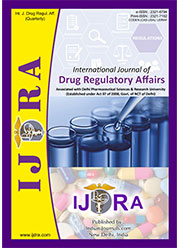Types of Biowaivers: A Discussion
Abstract
The aim of the present review is to discuss the different types of biowaiver applications. Waiving of In vivo bioequivalence studies is known as biowaiver. Types of biowaiver applications include BCS based biowaiver, well established use application, also known as bibliographical application and Literature based submission. Biowaiver is acceptable for both BCS class I as well as class III drug molecules. These kinds of applications are generally submitted to countries like US, European Union and Australia. Well established use application and literature based submission is acceptable if the drug product is available in the market for at least ten years. The latter are acceptable by Europe and Australia only. This review discusses various types of biowaiver applications accepted by the regulated markets.
Downloads
References
http://www.journalofpharmaceuticalresearch.org/index.php/kpc/article/view/118768
2. Leslie Z. Benet. The Role of BCS (Biopharmaceutics Classification System) and BDDCS (Biopharmaceutics Drug Disposition Classification System) in Drug Development, Journal of Pharmaceutical Sciences [Internet]. 2013 [cited 2019 Jul 11]; 102(1): 34-42. Available from:
https://jpharmsci.org/article/S0022-3549(15)31278-8/fulltext
3. Barbara M. Davit Isadore Kanfer, Yu Chung Tsang, and Jean-Michel Cardot. BCS Biowaivers: Similarities and Differences among EMA, FDA and WHO Requirements, American Association of Pharmaceutical Scientists [Internet]. 2016 [cited 2019 Jul 22]; 18(3). Available from:
https://www.ncbi.nlm.nih.gov/pmc/articles/PMC5256598/
4. FDA [Internet]. Waiver of In vivo Bioavailability and Bioequivalence Studies for Immediate-Release Solid Oral Dosage Forms Based on a Biopharmaceutics Classification System Guidance for Industry, U.S. Department of Health and Human Services Food and Drug Administration. Centre for Drug Evaluation and Research (CDER); 2017 [cited 2019 Jul 13]. Available from:
https://www.fda.gov/media/70963/download
5. European Medicines Agency [Internet]. Guideline on the Investigation of Bioequivalence, Committee for Medicinal Products for Human Use (CHMP); 2010 [cited 2019 Jul 21]. Available from:
https://www.ema.europa.eu/en/documents/scientific-guideline/guideline-investigation-bioequivalence-rev1_en.pdf
6. WHO Expert Committee on Specifications for Pharmaceutical Preparations, Multisource (generic) pharmaceutical products: guidelines on registration requirements to establish interchangeability, Annex 6 [Internet]. WHO; 2017 [cited 2019 Jul 13]. Available from:
http://apps.who.int/medicinedocs/documents/s23245en/s23245en.pdf
7. EMA [Internet]. European Medicines Agency pre-authorisation procedural advice for users of the centralised procedure; 2019 Apr [cited 2019 Jul 15]. Available from:
https://www.ema.europa.eu/en/documents/regulatory-procedural-guideline/european-medicines-agency-pre-authorisation-procedural-advice-users-centralised-procedure_en-0.pdf
8. Australia TGA guideline for Literature Based Submission [Internet]. TGA; 2003 [cited 2019 Jul 21]; 10:3. Available from:
https://www.tga.gov.au/publication/literature-based-submissions

This work is licensed under a Creative Commons Attribution-NonCommercial 4.0 International License.
The International Journal of Drug Regulatory affairs require a formal written transfer of copyright from the author(s) for each article published. We therefore ask you to complete and return this form, retaining a copy for your records. Your cooperation is essential and appreciated. Any delay will result in a delay in publication.
I/we have read and agree with the terms and conditions stated Page 2 of this agreement and I/we hereby confirm the transfer of all copyrights in and relating to the above-named manuscript, in all forms and media, now or hereafter known, to the International Journal of Drug Regulatory affairs, effective from the date stated below. I/we acknowledge that the IJDRA is relying on this agreement in publishing the above-named manuscript. However, this agreement will be null and void if the manuscript is not published in the IJDRA.
Download link for COPYRIGHT FORM







